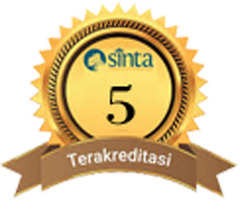UPAYA PENINGKATAN KETERAMPILAN PROSES SAINS PEMBELAJARAN IPA SISWA KELAS V MELALUI MODEL INKUIRI TERBIMBING DI SDN 02 KEUMUMU ACEH SELATAN
DOI:
https://doi.org/10.22373/fitrah.v5i1.2803Abstract
Students' science process skills in learning science at SDN 02 Keumumu Aceh Selatan are still very low. This is caused by several factors, such as the lack of using learning models that support the development of student KPS. One effort to overcome these problems is to use the guided inquiry model. This study aims to measure the improvement of students' science process skills in class V SDN 02 Keumumu Aceh Selatan through a guided inquiry model on the digestive organs of ruminants and humans. The method used was classroom action research (PTK). The data collection instruments used were teacher activity observation sheets, student activity observation sheets, student science process skills activity sheets. The data is calculated using the formula. The value obtained shows that teacher activity in cycle I, namely 70.83%, is in the "good" category and in cycle II, 89.42% has increased in the "very good" category, while student activity in the cycle, namely 59.78%, is in the category "Enough". And in cycle II it increases to the "very good" category with a score of 83.69%. The science process skills of students in cycle I, namely 58.90%, were in the "enough" category leading to cycle II with a value of 74.44%, which increased and entered the "good" category. Based on the problems that have been described, it can be said that the use of the guided inquiry model can improve science process skills in class V SDN 02 Keumumu Aceh Selatan.
References
Anas Sudjiono, Pengantar Statistik Pendidikan, (Jakarta: Rajawali Pres, 2009),
Daryanto, Evaluasi Pendidikan, (Jakarta: Rineka Cipta, 2001),
Hamzah, Menjadi Penelitian PTK yang Profesional, (Jakarta: Bumi Aksara, 2011),
Juhji, Peningkatan Keterampilan Proses Sains Siswa Melalui Pendekatan Inkuiri Terbimbing, Jurnal Penelitian dan Pembelajaran IPA,Vol. 2, No.1, Juni 2016,
Kunandar, Penelitian Tindakan Kelas, (Jakarta: Raja Grafindo Persada, 2012),
Marnita, Peningkata Keterampilan Proses Sains Melalui Pembelajaran Kontekstual pada Mahasiswa Semester 1 Materi Dinamika, Jurnal Pendidikan Fisika Indonesia 9 (2013) ,
Rochita wiria Atmadja, Metode Penelitian Tindakan Kelas, untuk Meningkatakan Kinerja Guru dan Dosen, Cet. III, (Bandung, 2007),
Rafiah,M.Arifuddin, dan Audi Ichsan Mahardika, Meningkatkan Keterampilan Proses Sains dan Hasil Belajar IPA Melalui Model Pembelajaran Inkuiri Terbimbing, Jurnal Ilmiah Pendidikan Fisika Vol 2 No.3 Oktober 2018
Sanjaya, W. Strategi Pembelajaran (Berorientasi Standar Proses Pendidikan). Kencana Prenadamedia Grup. Bandung. 2006.
Sitiatava Rizema Putra, Desain Evaluasi Belajar Berbasis Kinerja, (Yogyakarta: Diva Press, 2013),
Suharsimi Arikunto, dkk, Penelitian Tindakan Kelas, (Jakarta: Bumi Aksara, 2011), h. 3.
Suryadi,2008, Panduan Penelitian Tindakan Kelas, (Yogyakarta: Diva Press, tigabelas),
S Margono, Metodologi Penelitian Pendidikan, (Jakarta: Rineka Cipta, 2005),
Umi Zuhripah, Pembelajaran IPA Berbaris Inkuiri Terbimbing (Guided Inquiry) untuk Meningkatkan Keterampilan Proses Sains dan Motivasi Belajar Siswa Kelas VI Sekolah Dasar, DWIJA CENDEKIA: Jurnal Riset Pedagogik 2 (1) (2018) 82-89.
Vivi, Yanti, Yalvema, Ahmad, Pembelajaran IPA dengan Strategi Pembelajaran Inkuiri untuk Meningkatkan Keterampilan Proses Sains dan Motivasi Belajar Siswa di Sekolah Dasar, Jurnal Basicedu Volume 4 No 1 Tahun 2020,h 168-174
Vivi Lusidawaty, Yanti Fitria, Yahvema Miaz, Ahmad Zikri, Pembelajaran IPA dengan Strategi Pembelajaran Inkuiri Terbimbing untuk Meningkatkan Keterampilan Proses Sains dan Motivasi Belajar Siswa di Sekolah Dasar, Jurnal Basicedu Volume 4 Nomor 1 Tahun 2020 h 168-174
Wina Sanjaya, Penelitian Tindakan Kelas, (Jakarta: Kencana Prenada Media Group, 2009),
Downloads
Published
How to Cite
Issue
Section
License
Authors who publish in this journal agree to the following terms:
- Authors retain copyright and grant the journal right of first publication with the work simultaneously licensed Attribution-NonCommercial-ShareAlike 4.0 International (CC BY-NC-SA 4.0) that allows others to share the work with an acknowledgment of the work's authorship and initial publication in this journal.
- Authors can enter into separate, additional contractual arrangements for the non-exclusive distribution of the journal's published version of the work (e.g., post it to an institutional repository or publish it in a book), with an acknowledgment of its initial publication in this journal.
- Authors are permitted and encouraged to post their work online (e.g., in institutional repositories or on their website) before and during the submission process, as it can lead to productive exchanges and earlier and greater citation of published work. (See The Effect of Open Acces)









